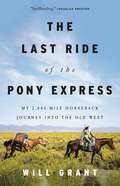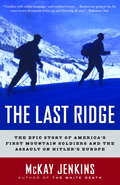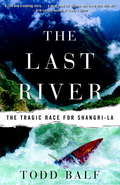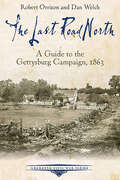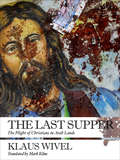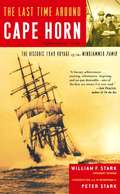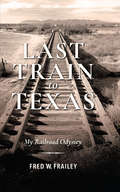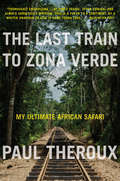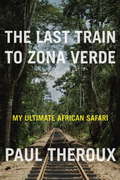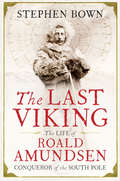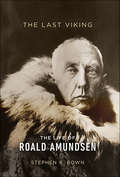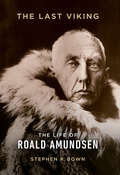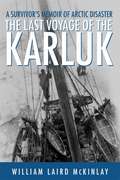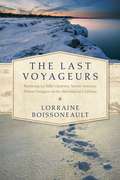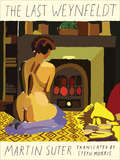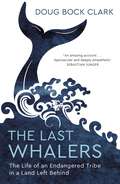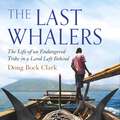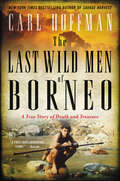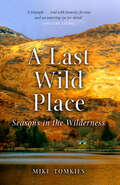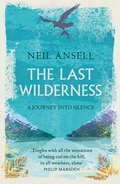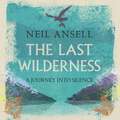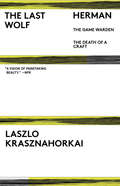- Table View
- List View
The Last Ride of the Pony Express: My 2,000-mile Horseback Journey into the Old West
by Will Grant"Spellbinding" (Douglas Preston) and "completely fascinating" (Elizabeth Letts), cowboy and journalist Will Grant takes us on an epic and authentic horseback journey into the modern West on an adventure of a lifetime. The Last Ride of the Pony Express boldly illuminates both our mythic fascination with the Pony Express, and how its spirit continues to this day. The Pony Express was a fast-horse frontier mail service that spanned the American West— the high, dry, and undeniably lonesome part of North America. While in operation during the 1860s, it carried letter mail on a blistering ten-day schedule between Missouri and San Francisco, running through a vast and mostly uninhabited wilderness. It covered a massive distance—akin to running horses between Madrid and Moscow— and to this day, the Pony Express is irrefutably the greatest display of American horsemanship to ever color the pages of a history book. Though the Pony Express has enjoyed a lot of traction over the years, among the authors that have attempted to encapsulate it, none have ever ridden it themselves. While most scholars would look for answers inside a library, Will Grant looks for his between the ears of a horse. Inspired by the likes of Mark Twain, Sir Richard Burton, and Horace Greeley, all of whom traveled throughout the developing West, Will Grant returned to his roots: he would ride the trail himself with his two horses, Chicken Fry and Badger, from one end to the other. Will Grant captures the spirit of the west in a way that few writers have. Along with rich encounters with the ranchers, farmers, historians, and businessmen who populate the trail, his exploits on horseback offer an intimate portrait of how the West has evolved from the rough and tumble 19th century to the present, and it&’s written with such intimacy that you&’ll feel as though you&’re riding right alongside of him. Along the way, he fights off wild mustangs wanting to steal his horses in Utah, camps with Peruvian sheepherders in the mountains, and even spends three days riding under the Top Gun aviator school in Nevada, which are just a handful of extraordinary tales Will Grant unveils as he makes his way across the treacherous and, at times, thrilling landscape of the known and unknown American West. The Last Ride of the Pony Express is a uniquely tenacious tale of adventure by a native son of the West who defies most modern conveniences to compass some two thousand miles on horseback. The result is an unforgettable narrative that will forever change how you see the West, the Pony Express, and America as a whole.
The Last Ridge
by Mckay JenkinsWhen World War II broke out in Europe, the American army had no specialized division of mountain soldiers. But in the winter of 1939–40, after a tiny band of Finnish mountain troops brought the invading Soviet army to its knees, an amateur skier named Charles Minot “Minnie” Dole convinced the United States Army to let him recruit an extraordinary assortment of European expatriates, wealthy ski bums, mountaineers, and thrill-seekers and form them into a unique band of Alpine soldiers. These men endured nearly three years of grueling training in the Colorado Rockies and in the process set new standards for both soldiering and mountaineering. The newly forged 10th Mountain Division finally faced combat in the winter of 1945, in Italy’s Apennine Mountains, against the seemingly unbreakable German fortifications north of the Gothic Line. There, they planned and executed what is still regarded as the most daring series of nighttime mountain attacks in U. S. military history, taking Mount Belvedere and the sheer, treacherous face of Riva Ridge to smash the linchpin of the German army’s lines. Drawing on unique cooperation from veterans of the 10th Mountain Division and a vast archive of unpublished letters and documents, The Last Ridge is written with enormous warmth, energy, and honesty. This is one of the most captivating stories of World War II, a blend of Band of Brothers and Into Thin Air. It is a story of young men asked to do the impossible, and succeeding. From the Hardcover edition.
The Last River
by Todd BalfIt was the ultimate whitewater adventure on the Mount Everest of rivers, and the biggest challenge of their lives....October 1998 an American whitewater paddling team traveled deep into the Tsangpo Gorge in Tibet to run the Yarlung Tsangpo, known in paddling circles as the "Everest of rivers." On Day 12 of that trip, the team's ace paddler, one of four kayakers on the river, launched off an eight-foot waterfall and flipped. He and his overturned kayak spilled into the heart of the thunderous "freight training" river and were swept downstream, never to be seen again.The Last River: The Tragic Race for Shangri-la is a breathtaking account of this ill-fated expedition, a fascinating exploration of what propelled these kayakers to take on the seething big water and perilous Himalayan terrain of the deepest gorge on the planet. This was the magical Shangri-la of legend, a 140-mile-long canyon framed by 25,000-foot snowcapped peaks, a place of unimaginable beauty called Pemako in ancient Buddhist texts that was rumored to contain mammoth waterfalls. At the close of the twentieth century, an end-to-end descent of the gorge filled the imaginations of some of the best boaters in the world, who saw in the foam and fury of the Tsangpo's rapids the ultimate whitewater challenge. For Wick Walker and Tom McEwan, extreme whitewater pioneers, best friends, and trip leaders, the Tsangpo adventure with Doug Gordon, Olympic medal-winning paddler Jamie McEwan (Tom's brother), and Roger Zbel was the culmination of a twenty-five-year quest. Fueled by narratives of early explorers, Walker and McEwan kept their dream alive and waited until the Chinese government opened the gorge to Westerners. With financial backing from the National Geographic Society, the group was finally good to go in 1998. Swollen to three times the size they had expected because of record rains and heavy snowmelt, the Tsangpo lived up to its fearsome reputation. On numerous occasions the team questioned whether to continue, but chose to press forward. The Last River probes beyond the extreme sports clichés and looks at the complex personal and intellectual reasons for the seemingly irresistible draw of Tibet's Great River. For Walker, Gordon, Zbel, and the McEwans -- husbands, fathers, friends, and brothers -- the Tsangpo wasn't a run toward death but a celebration of life, adventure, and the thing that tied them to one another -- awe-inspiring rivers. The Last River is also a riveting journey to one of the world's wildest and most alluring places, a thrilling book that invites us into the Himalayas of Jon Krakauer's classic, Into Thin Air, but from a totally new perspective -- on a historic river so remote that only the most hardy and romantic souls attempt to unlock its mysteries. Visit www.randomhouse.com/features/lastriverFrom the Hardcover edition.
The Last Road North: A Guide to the Gettysburg Campaign, 1863 (Emerging Civil War Series)
by Dan Welch Robert OrrisonA guide to the Gettysburg Civil War battlefields and their history, featuring lesser-known sites, side trips, and optional stops along the way."I thought my men were invincible,” admitted Robert E. Lee.A string of battlefield victories through 1862 had culminated in the spring of 1863 with Lee’s greatest victory yet: the battle of Chancellorsville. Propelled by the momentum of that supreme moment, confident in the abilities of his men, Lee decided to once more take the fight to the Yankees and launched this army on another invasion of the North.An appointment with destiny awaited in the little Pennsylvania college town of Gettysburg.Historian Dan Welch follows in the footsteps of the Army of Northern Virginia and the Army of the Potomac as the two foes cat-and-mouse their way northward, ultimately clashing in the costliest battle in North American history.Based on the Gettysburg Civil War Trails, and packed with dozens of lesser-known sites related to the Gettysburg Campaign, The Last Road North: A Guide to the Gettysburg Campaign offers the ultimate Civil War road trip.“Orrison and Welch have created something different. Historians must search for innovative ways to engage the public on the battle’s relevance. This book offers a new experience for tourists—one that enriches their visit to the site of one of the most consequential battles in American history.” —Matt Arendt, TCU, for Gettysburg Magazine“Shows a deep knowledge of the subject and the style of writing is clear and easy to follow . . . buy this book!” —Wargames, Soldiers & Strategy
The Last Supper: The Plight of Christians in Arab Lands
by Mark Kline Klaus Wivel"A central question that animates Wivel is why those in the West, who profess a belief in such universal values as freedom and equality, have not done more to defend the human rights of this severely beleaguered minority."--University Bookman"Revealing, shocking, and well-researched reading."--Jyllands-PostenIn 2013, alarmed by scant attention paid to the hardships endured by the 7.5 million Christians in the Middle East, journalist Klaus Wivel traveled to Iraq, Lebanon, Egypt, and the Palestinian territories on a quest to learn more about their fate. He found an oppressed minority, constantly under threat of death and humiliation, increasingly desperate in the face of rising Islamic extremism and without hope that their situation will improve, or anyone will come to their aid. Wivel spoke with priests whose churches have been burned, citizens who feel like strangers in their own countries, and entire communities whose only hope for survival may be fleeing into exile. With the increase of religious violence in the past few years, this book is a prescient and unsettling account of a severely beleaguered religious group living, so it seems, on borrowed time. Wivel asks, why have we not done more to protect these people? Klaus Wivel is a Danish journalist who has been the New York correspondent for Weekendavisen, one of Denmark's most prestigious newspapers. He has written on a wide range of topics, with a focus on the Middle East.
The Last Templar Collection: Volume 2
by Michael JecksTHE KNIGHTS TEMPLAR COLLECTION: VOLUME 2 brings together three more of Michael Jecks' most popular Knights Templar mysteries. Join Sir Baldwin de Furnshill and Baliff Simon Puttock as they journey from England to France, and back again, in three riveting tales of murder and intrigue.The Templar, the Queen & Her Lover: Queen Isabella, wife to Edward II of England, has been dispatched to France in an attempt to bring about peace between the two countries, and Sir Baldwin de Furnshill must accompany her with his friend Simon Puttock. But the day after their arrival, a servant is found murdered, with Baldwin's dagger lying next to the body.As Baldwin struggles to prove his innocence, the killer strikes again. With so many English enemies gathering in Paris, will he be able to expose the culprit in time to protect the diplomats and their mission?The Prophecy of Death: It's 1325, and in England turmoil is rife. But could the Prophecy of St Thomas's Holy Oil be the key to saving the ill-fated reign of King Edward II? It is believed the one anointed with it will be a lion among men: he will conquer France, unite Christendom and throw the heathens from the Holy Land.Meanwhile, Sir Baldwin de Furnshill, Keeper of the King's Peace, and his friend Simon Puttock return from France with urgent messages for the King himself. Soon they find themselves at the centre of a deadly court intrigue involving the most powerful and ruthless men in the country, who will stop at nothing, not even murder, to achieve their ambitions...The King of Thieves: 1325: Sir Baldwin de Furnshill and his friend Simon Puttock are in France guarding King Edward's son on his perilous journey to meet the French king, Charles IV. But they are unaware that King Edward's wife Isabella is disaffected and plotting her revenge...What first appears a simple diplomatic mission is fast becoming lethally dangerous. Meanwhile, two murders in Paris are causing alarm. Is there a connection between the killings and the shadowy 'King' of thieves? Simon and Baldwin know the future of the English crown is at risk. And in order to protect it they must put their own lives in jeopardy.What readers are saying about The Knights Templar mysteries:'Full of twists and turns right up until the end''Superb, with a diverse and fantastic cast of characters, mixing historical fact with the author's creations - and they blend beautifully''Jecks continues to astonish me in adherence to historical accuracy but also in his ability to write a tale so well'
The Last Time Around Cape Horn: The Historic 1949 Voyage of the Windjammer Pamir
by William F. StarkA memorable tale of adventure on the turbulent seas of the Great Southern and Atlantic oceans--on one of the most historic voyages of our time--finds its way into paperback. This is William F. Stark's engrossing memoir of the last leg of the Grain Race, and the Pamir's rounding of fearsome Cape Horn--the storm-tossed tip of South America just 600 miles from Antarctica--the veritable Mount Everest of sailing. In 1949, the crew of thirty-four sailors from around the world experienced the shipboard life of the seventeenth century on a four-masted vessel that carried hundreds of acres of sail. In 128 days the Pamir journeyed 16,000 miles from Port Victoria, Australia, to Falmouth, England, through the world's stormiest seas, as Stark worked on decks awash with huge swells, and scrambled up ice-coated rigging to manhandle sails on masts that were up to twenty stories high. Contrasting romance with the realities of life at sea, and poignantly evoking the love affair he left behind to join the Pamir, while punctuating his tale with illuminating photos, maps, and details of maritime history, Stark has written a thrilling book that climaxes the fabled era begun by Cape Horn merchant sailors more than three centuries ago.
Last Train to Texas: My Railroad Odyssey (Railroads Past And Present Ser.)
by Fred W. FraileyA veteran railroad columnist takes readers on a wild ride through the American train industry with remembrances that crisscross the country and the world.In Last Train to Texas, author Fred W. Frailey examines the workings behind the railroad industry and captures incredible true stories along the way. He vividly portrays the industries larger-than-life characters, such as William “Pisser Bill” F. Thompson, who weathered financial ruin, bad merger deals, and cutthroat competition, all while racking up enough notoriety to inspire a poem titled “Ode to a Jerk.”Whether he’s riding the Canadian Pacific Railway through a blizzard, witnessing a container train burglary in the Abo Canyon, or commemorating a poem to Limerick Junction in Dublin, Frailey’s journeys are rife with excitement, incident, and the spirit of the rails. Filled with humorous anecdotes and thoughtful insights into the railroading industry, Last Train to Texas is a grand adventure for the railroad connoisseur.
Last Train to Texas: My Railroad Odyssey (Railroads Past And Present Ser.)
by Fred W. FraileyA veteran railroad columnist takes readers on a wild ride through the American train industry with remembrances that crisscross the country and the world.In Last Train to Texas, author Fred W. Frailey examines the workings behind the railroad industry and captures incredible true stories along the way. He vividly portrays the industries larger-than-life characters, such as William “Pisser Bill” F. Thompson, who weathered financial ruin, bad merger deals, and cutthroat competition, all while racking up enough notoriety to inspire a poem titled “Ode to a Jerk.”Whether he’s riding the Canadian Pacific Railway through a blizzard, witnessing a container train burglary in the Abo Canyon, or commemorating a poem to Limerick Junction in Dublin, Frailey’s journeys are rife with excitement, incident, and the spirit of the rails. Filled with humorous anecdotes and thoughtful insights into the railroading industry, Last Train to Texas is a grand adventure for the railroad connoisseur.
The Last Train to Zona Verde: My Ultimate African Safari
by Paul TherouxThe acclaimed author of Dark Star Safari journeys across western Africa in this &“thoroughly engrossing [and] at times tragic&” travelogue (Washington Post).Paul Theroux&’s best-selling Dark Star Safari chronicled his epic overland voyage from Cairo to Cape Town, providing an insider&’s look at modern Africa. Now, with The Last Train to Zona Verde, he returns to discover how both he and Africa have changed in the ensuing years. Traveling alone, Theroux sets out from Cape Town, going north through South Africa, Namibia, then into Angola, encountering a world increasingly removed from tourists&’ itineraries and the hopes of postcolonial independence movements. After covering nearly 2,500 arduous miles, Theroux cuts short his journey, a decision he chronicles with unsparing honesty in a chapter titled &“What Am I Doing Here?&” Vivid, witty, and beautifully evocative, The Last Train to Zona Verde is a fitting final African adventure from the writer whose gimlet eye and effortless prose have brought the world to generations of readers. &“If this book is proof, age has not slowed Theroux or encouraged him to rest on his achievements . . . Gutsy, alert to Africa's struggles, its injustices and history.&” — San Francisco Chronicle
The Last Train to Zona Verde
by Paul TherouxFor all Theroux travel writing fans and particularly the legions of lovers of Dark Star Safari and Eastern Star. Acclaimed travel writer Paul Theroux resumes the African trip recounted in his brilliant Dark Star Safari, from Cairo to Capetown down the right-hand of Africa. For ten years he longed to return Capetown, and travel up the the left-hand side to Congo. After 50 years of travel and past retirement age, this is the last trip of this kind the author will take, and this is the story his fans have been waiting for.
The Last Viking: The Life of Roald Amundsen, Conqueror of the South Pole (A\merloyd Lawrence Book Ser.)
by Stephen BownThis “fascinating biography” of the Norwegian explorer who beat Robert Scott to the South Pole is “intelligent and often thrilling” (London Sunday Times).The most feted explorer of his generation, Roald Amundsen counted the discovery of the Northwest Passage, in 1905, as well as the North Pole amongst his greatest achievements. His revolutionary approach to technology transcends polar and nautical significance. However, until now, his story has rarely featured as more than a footnote to Scott’s tragic failure.Reviled for defeating Scott but worshipped by his men, Amundsen was pursued by women and creditors throughout his life before disappearing on a mission to rescue an Italian explorer attempting to claim the North Pole for Mussolini. The Last Viking is the life of a visionary and a showman, who brought the era of Shackleton to an end, put the newly independent Norway on the map, and was the twentieth century’s brightest trailblazing explorer.
The Last Viking: The Life of Roald Amundsen (A Merloyd Lawrence Book)
by Stephen R. BownThe Last Viking unravels the life of the man who stands head and shoulders above all those who raced to map the last corners of the world. In 1900, the four great geographical mysteries—the Northwest Passage, the Northeast Passage, the South Pole, and the North Pole—remained blank spots on the globe. Within twenty years Roald Amundsen would claim all four prizes. Renowned for his determination and technical skills, both feared and beloved by his men, Amundsen is a legend of the heroic age of exploration, which shortly thereafter would be tamed by technology, commerce, and publicity. Féted in his lifetime as an international celebrity, pursued by women and creditors, he died in the Arctic on a rescue mission for an inept rival explorer. Stephen R. Bown has unearthed archival material to give Amundsen’s life the grim immediacy of Apsley Cherry-Garrard’s The Worst Journey in the World, the exciting detail of The Endurance, and the suspense of a Jon Krakauer tale. The Last Viking is both a thrilling literary biography and a cracking good story.
The Last Viking
by Stephen R. BownIn the early 1900s, many of the great geographical mysteries that had intrigued adventurers for centuries remained unsolved: the polar regions -- the Northwest Passage, the South Pole, the North Pole and the Northeast Passage -- despite having claimed countless lives, were still shrouded in mystery. One man would claim all these prizes within a span of 20 years.Roald Amundsen was larger than life, arrogant and competitive. He was also a meticulous organizer and planner, willing to learn from the mistakes of others, and humble enough to seek the advice of indigenous peoples skilled in arctic survival -- thus avoiding the early death that was so common among other explorers.But Amundsen's life was one of sharp contrasts: reviled by the British for defeating Robert Falcon Scott, he was loved by his men, hailed as a hero in his native Norway and idolized as a charming and eccentric celebrity in the US. Drawing on hundreds of recently uncovered press clippings, The Last Viking goes beyond Amundsen's conflicted legacy, revealing a humorous, self-deprecating storyteller and a visionary and showman who who won over both his sponsors and his audiences with the same verve that characterized his geographical conquests.
The Last Voyage of the Karluk
by William Laird MckinlayAn astonishing narrative of disaster and perseverance, The Last Voyage of the Karluk will thrill readers of adventure classics like Into Thin Air and The Climb. In 1913, explorer Vilhjalmur Stefansson hired William McKinlay to join the crew of the Karluk, the leading ship of his new Arctic expedition. Stefansson's mission was to chart the waters north of Alaska; yet the Karluk's crew was untrained, the ship was ill-suited to the icy conditions, and almost at once the Karluk was crushed-at which point Stefansson abandoned his crew to continue his journey on another ship. This is the only firsthand account of what followed: a nightmare struggle in which half the crew perished, one was mysteriously shot, and the rest were near death by the time of their rescue twelve months later.Written some sixty years after the fact, and drawing extensively on his own daily log, McKinlay's narrative of this doomed expedition is rendered with remarkable clarity of recollection, and with a combination of horror and a level of self-possession that, to modern eyes, may seem incredible. Like most of his companions, McKinlay was inexperienced, without a day's training in the skills essential to survival in the Arctic. Yet he and many of his fellow crewmen, with the help of an Eskimo family accustomed to such conditions, survived a year under the harshest of conditions, enduring 80-mile-per-hour gales and temperatures well below zero with only the barest of provisions and almost no hope of contact with civilization.Nearly a century later, this remains one of the most compelling survival stories ever written-an extraordinary testament to man's overpowering will to live.
The Last Voyageurs: Sixteen Teenagers on an Adventure of a Lifetime
by Lorraine BoissoneaultIn 1976, America's bicentennial, 24 young men set out to re-create French explorer La Salle's voyage down the entire length of the Mississippi River, abandoning their modern identities in order to live like the voyageurs of the 1600s... Reid Lewis never wanted to be an ordinary French teacher. With the approach of the American Bicentennial, he decided to put his knowledge of French language and history to use in recreating the voyage of René Robert Cavelier, Sieur de La Salle, the first European to travel from Montreal to the end of the Mississippi River. Lewis' crew of modern voyageurs was comprised of 16 high school students and 6 teachers who learned to sew their own 17th-century clothing, paddle handmade canoes, and construct black powder rifles. Together they set off on an eight-month, 3,300-mile expedition across the major waterways of North America. They fought strong currents on the St. Lawrence, paddled through storms on the Great Lakes, and walked over 500 miles across the frozen Midwest during one of the coldest winters of the 20th century, all while putting on performances about the history of French explorers for communities along their route. The crew had to overcome disagreements, a crisis of leadership, and near-death experiences before coming to the end of their journey. The Last Voyageurs tells the story of this American odyssey, where a group of young men discovered themselves by pretending to be French explorers.
The Last Weynfeldt
by Steph Morris Martin Suter<P> Adrian Weynfeldt is an art expert in an international auction house, a bachelor in his mid-fifties living in a grand Zurich apartment filled with costly paintings and antiques. Always correct and well-mannered, he's given up on love until one night-entirely out of character for him-Weynfeldt decides to take home a ravishing but unaccountable young woman. The next morning, he finds her outside on his balcony threatening to jump. Weynfeldt talks her down and soon finds himself falling for this damaged but alluring beauty and his buttoned up existence comes unraveled. As their two lives become entangled, Weynfeldt gets embroiled in an art forgery scheme that threatens to destroy everything he and his prominent family have stood for. This refined page-turner moves behind elegant bourgeois facades into darker recesses of the heart. <P> Martin Suter, born in Zurich in 1948, is a novelist and screenwriter. He has written a dozen novels, many of them bestsellers in Europe and translated into thirty-two languages. Suter lives with his family in Zurich.
The Last Whalers: The Life of an Endangered Tribe in a Land Left Behind
by Doug Bock Clark'Remarkable... a rich, novelistic account based on diligent reporting ... An empathetic, even intimate account, but not a dewy-eyed one ... Wonderful' Daily Telegraph'I absolutely loved this magnificent book' Sebastian Junger'A monumental achievement' Mitchell Zuckoff'[An] immersive, densely reported and altogether remarkable first book ... The Last Whalers has the texture and colouring of a first-rate novel' New York TimesAt a time when global change has eradicated thousands of unique cultures, The Last Whalers tells the stunning inside story of the Lamalerans, an ancient tribe of 1,500 hunter-gatherers who live on a volcanic island so remote it is known by other Indonesians as "The Land Left Behind." They have survived for centuries by taking whales with bamboo harpoons, but now are being pushed toward collapse by the encroachment of the modern world.Award-winning journalist Doug Bock Clark, who lived with the Lamalerans across three years, weaves together their stories with novelistic flair to usher us inside this hidden drama. Jon, an orphaned apprentice whaler, strives to earn his harpoon and feed his ailing grandparents. Ika, Jon's indomitable younger sister, struggles to forge a modern life in a tradition-bound culture and realize a star-crossed love. Ignatius, a legendary harpooner entering retirement, labors to hand down the Ways of the Ancestors to his son, Ben, who would rather become a DJ in the distant tourist mecca of Bali.With brilliant, breathtaking prose and empathetic, fast-paced storytelling, Clark details how the fragile dreams of one of the world's dwindling indigenous peoples are colliding with the irresistible upheavals of our rapidly transforming world, and delivers to us a group of families we will never forget.
The Last Whalers: The Life of an Endangered Tribe in a Land Left Behind
by Doug Bock Clark'Remarkable... a rich, novelistic account based on diligent reporting ... An empathetic, even intimate account, but not a dewy-eyed one ... Wonderful' Daily Telegraph'I absolutely loved this magnificent book' Sebastian Junger'A monumental achievement' Mitchell ZuckoffThe epic story of the world's last subsistence whalers.At a time when global change has eradicated thousands of unique cultures, The Last Whalers tells the stunning inside story of the Lamalerans, an ancient tribe of 1,500 hunter-gatherers who live on a volcanic island so remote it is known by other Indonesians as "The Land Left Behind." They have survived for centuries by taking whales with bamboo harpoons, but now are being pushed toward collapse by the encroachment of the modern world.Award-winning journalist Doug Bock Clark, who lived with the Lamalerans across three years, weaves together their stories with novelistic flair to usher us inside this hidden drama. Jon, an orphaned apprentice whaler, strives to earn his harpoon and feed his ailing grandparents. Ika, Jon's indomitable younger sister, struggles to forge a modern life in a tradition-bound culture and realize a star-crossed love. Ignatius, a legendary harpooner entering retirement, labors to hand down the Ways of the Ancestors to his son, Ben, who would rather become a DJ in the distant tourist mecca of Bali.With brilliant, breathtaking prose and empathetic, fast-paced storytelling, Clark details how the fragile dreams of one of the world's dwindling indigenous peoples are colliding with the irresistible upheavals of our rapidly transforming world, and delivers to us a group of families we will never forget.(P)2019 Hodder & Stoughton Limited
The Last Wild Men of Borneo: A True Story of Death and Treasure
by Carl HoffmanA 2019 EDGAR AWARDS NOMINEE (BEST FACT CRIME) • A BANFF MOUNTAIN BOOK AWARDS FINALISTTwo modern adventurers sought a treasure possessed by the legendary “Wild Men of Borneo.” One found riches. The other vanished forever into an endless jungle. Had he shed civilization—or lost his mind? Global headlines suspected murder. Lured by these mysteries, New York Times bestselling author Carl Hoffman journeyed to find the truth, discovering that nothing is as it seems in the world’s last Eden, where the lines between sinner and saint blur into one.In 1984, Swiss traveler Bruno Manser joined an expedition to the Mulu caves on Borneo, the planet’s third largest island. There he slipped into the forest interior to make contact with the Penan, an indigenous tribe of peace-loving nomads living among the Dayak people, the fabled “Headhunters of Borneo.” Bruno lived for years with the Penan, gaining acceptance as a member of the tribe. However, when commercial logging began devouring the Penan’s homeland, Bruno led the tribe against these outside forces, earning him status as an enemy of the state, but also worldwide fame as an environmental hero. He escaped captivity under gunfire twice, but the strain took a psychological toll. Then, in 2000, Bruno disappeared without a trace. Had he become a madman, a hermit, or a martyr?American Michael Palmieri is, in many ways, Bruno’s opposite. Evading the Vietnam War, the Californian wandered the world, finally settling in Bali in the 1970s. From there, he staged expeditions into the Bornean jungle to acquire astonishing art and artifacts from the Dayaks. He would become one of the world’s most successful tribal-art field collectors, supplying sacred works to prestigious museums and wealthy private collectors. And yet suspicion shadowed this self-styled buccaneer who made his living extracting the treasure of the Dayak: Was he preserving or exploiting native culture?As Carl Hoffman unravels the deepening riddle of Bruno’s disappearance and seeks answers to the questions surrounding both men, it becomes clear saint and sinner are not so easily defined and Michael and Bruno are, in a sense, two parts of one whole: each spent his life in pursuit of the sacred fire of indigenous people. The Last Wild Men of Borneo is the product of Hoffman’s extensive travels to the region, guided by Penan through jungle paths traveled by Bruno and by Palmieri himself up rivers to remote villages. Hoffman also draws on exclusive interviews with Manser’s family and colleagues, and rare access to his letters and journals. Here is a peerless adventure propelled by the entwined lives of two singular, enigmatic men whose stories reveal both the grandeur and the precarious fate of the wildest place on earth.
A Last Wild Place: Seasons in the Wilderness
by Mike TomkiesWhen Mike Tomkies moved to a remote cottage on the shores of Loch Shiel in the West Highlands of Scotland, he found a place which was to provide him with the most profound wilderness experience of his life. Accessible only by boat, the cottage he renamed ‘Wildernesse’ was to be his home for many years, which he shared with his beloved German Shepherd, Moobli. Centred on different landscape elements – loch, woodlands and mountains –Tomkies describes the whole cycle of nature through the seasons in a harsh and testing environment of unrivalled beauty. Vivid colours and sounds fill the pages – exotic wild orchids, the roar of rutting stags, the territorial movements of foxes, otters and badgers, an oak tree being torn apart by hurricane-force gales. Nothing escapes his penetrating eye. His extraordinary insights into the wildlife that shared his otherwise empty territory were not gained without perseverance in the face of perilous hazards, and the difficulties and challenges of life in the wilderness are a key part of this remarkable book.
The Last Wilderness: A Journey into Silence
by Neil AnsellNeil Ansell's THE LAST WILDERNESS is a mesmerising book on nature and solitude by a writer who has spent his lifetime taking solitary ventures into the wild. For any readers of the author's previous book, DEEP COUNTRY, Robert Macfarlane's THE OLD WAYS or William Atkins THE MOOR.Shortlisted for the 2018 Wainwright Golden Beer Book PrizeShortlisted for the 2018 Highland Book Prize 'Ansell has the rare skill of combining vividly the intimacy of detail and the astonishing grandeur of this North West coastline of Scotland. Through his keen eyes we look again at the familiar with a sense of wondrous revelation' Madeleine Bunting 'Beautiful...a testimony to reticent courage' Daily MailThe experience of being in nature alone is here set within the context of a series of walks that Neil Ansell takes into the most remote parts of Britain, the rough bounds in the Scottish Highlands. He illustrates the impact of being alone as part of nature, rather than outside it.As a counterpoint, Neil Ansell also writes of the changes in the landscape, and how his hearing loss affects his relationship with nature as the calls of the birds he knows so well become silent to him.
The Last Wilderness: A Journey into Silence
by Neil AnsellNeil Ansell's THE LAST WILDERNESS is a mesmerising book on nature and solitude by a writer who has spent his lifetime taking solitary ventures into the wild. For any readers of the author's previous book, DEEP COUNTRY, Robert Macfarlane's THE OLD WAYS or William Atkins THE MOOR.Shortlisted for the 2018 Wainwright Golden Beer Book PrizeShortlisted for the 2018 Highland Book Prize 'Ansell has the rare skill of combining vividly the intimacy of detail and the astonishing grandeur of this North West coastline of Scotland. Through his keen eyes we look again at the familiar with a sense of wondrous revelation' Madeleine Bunting 'Beautiful...a testimony to reticent courage' Daily MailThe experience of being in nature alone is here set within the context of a series of walks that Neil Ansell takes into the most remote parts of Britain, the rough bounds in the Scottish Highlands. He illustrates the impact of being alone as part of nature, rather than outside it.As a counterpoint, Neil Ansell also writes of the changes in the landscape, and how his hearing loss affects his relationship with nature as the calls of the birds he knows so well become silent to him.
The Last Wilderness: A Journey into Silence
by Neil AnsellNeil Ansell's THE LAST WILDERNESS is a mesmerising book on nature and solitude by a writer who has spent his lifetime taking solitary ventures into the wild. For any readers of the author's previous book, DEEP COUNTRY, Robert Macfarlane's THE OLD WAYS or William Atkins THE MOOR.'A gem of a book, an extraordinary tale. Ansell's rich prose will transport you to a real life Narnian world that C.S.Lewis would have envied. Find your deepest, most comfortable armchair and get away from it all' CountryfileThe experience of being in nature alone is here set within the context of a series of walks that Neil Ansell takes into the most remote parts of Britain, the rough bounds in the Scottish Highlands. He illustrates the impact of being alone as part of nature, rather than outside it.As a counterpoint, Neil Ansell also writes of the changes in the landscape, and how his hearing loss affects his relationship with nature as the calls of the birds he knows so well become silent to him.(P)2018 Headline Publishing Group Ltd
The Last Wolf & Herman
by George Szirtes John Batki László KrasznahorkaiTwo short masterworks by the most recent winner of the Man Booker International Prize: here, in miniature, is every reason why he won The Last Wolf, translated by George Szirtes, features a classic, obsessed Krasznahorkai narrator, a man hired to write (by mistake, by a glitch of fate) the true tale of the last wolf of Extremadura, a barren stretch of Spain. This miserable experience (being mistaken for another, dragged about a cold foreign place, appalled by a species' end) is narrated--all in a single sentence--as a sad looping tale, a howl more or less, in a dreary wintry Berlin bar to a patently bored bartender. The Last Wolf is Krasznahorkai in a maddening nutshell--with the narrator trapped in his own experience (having internalized the extermination of the last creature of its kind and "locked Extremadura in the depths of his own cold, empty, hollow heart")--enfolding the reader in the exact same sort of entrapment to and beyond the end, with its first full-stop period of the book. Herman, "a peerless virtuoso of trapping who guards the splendid mysteries of an ancient craft gradually sinking into permanent oblivion," is asked to clear a forest's last "noxious beasts." In Herman I: the Game Warden, he begins with great zeal, although in time he "suspects that maybe he was 'on the wrong scent.'" Herman switches sides, deciding to track entirely new game... In Herman II: The Death of a Craft, the same situation is viewed by strange visitors to the region. Hyper-sexualized aristocratic officers on a very extended leave are enjoying a saturnalia with a bevy of beauties in the town nearest the forest. With a sense of effete irony, they interrupt their orgies to pitch in with the manhunt of poor Herman, and in the end, "only we are left to relish the magic bouquet of this escapade..." Translated by John Batki.
